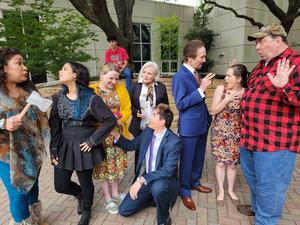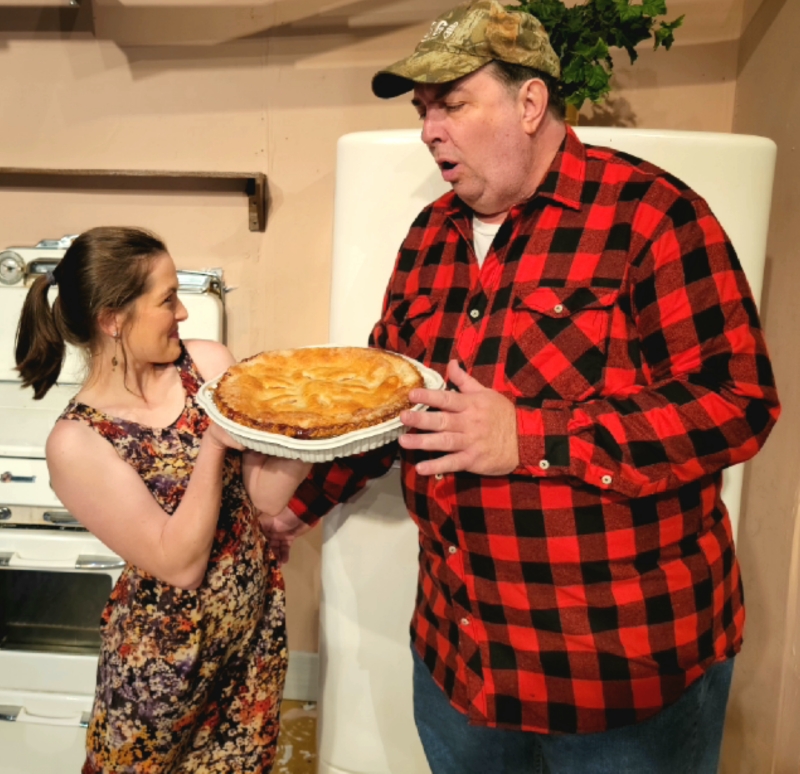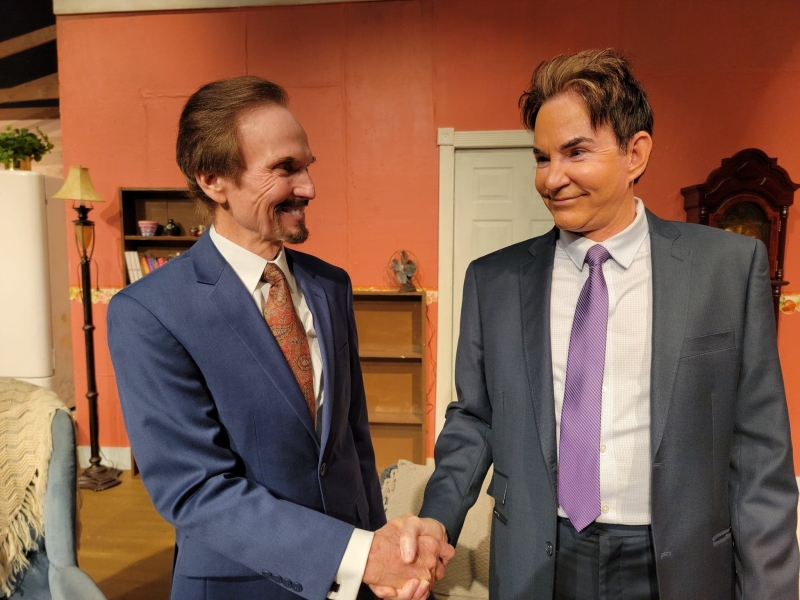Review: Mesquite Arts Theatre Gives a Beaming Performance of LIKE KISSING MOONLIGHT
Mesquite Arts Theatre’s production of LIKE KISSING MOONLIGHT highlights the realities of being part of a family–laughs, fights, losses, embraces, and most importantly, love and support. Mesquite Arts Center Black Box Theatre June 10-26.

When it comes to family, they know you for the good, the bad, the embarrassing, and the endearing. But let's be honest-family members know you best, which makes it extremely easy to bicker yet frustratingly hard to stay angry about what was said during an argument. Even the closest-knit families experience hardships and have differences of opinions, leading to big fights and necessary reconciliations. These nuances are authentically performed in Mesquite Arts Theatre's Regional Premiere of Like Kissing Moonlight, written and directed by Stacey Upton Bracey. In this play, an Appalachian family yells, fights, rolls eyes, and slams doors, but not without laughs, hugs, smiles, and encouraging farewells.
I was excited to spend a beautiful summer Sunday with Mesquite Arts Theatre, and apparently so was everyone else. The theatre was packed for this sold out performance! Friends were saying "hello" in the lobby, theatre-goers were becoming acquainted in their seats, and I felt overjoyed to be there to witness all of the cheerful connections being made. While conversations continued around me, I settled into my seat and started looking at the set. The lights were dimmed, but I could still see the different spaces represented along the stage-front porch, kitchen, sitting room, and hallway to the bedrooms. Set Designer, Kevin Velasquez, beautifully portrayed this charming, lived-in family home. Just looking at it was pleasing, and Stacey Upton Bracey's direction of how the space was used was impeccable. The set wasn't the only element that helped transport me to what felt like one of my University of Kentucky collegemate's grandmother's house; the costumes helped achieve this as well. Addam Vigil dressed each character in clothing that matched their personality (June wearing dark, edgy clothing and Crystal dressed in the colors of a "black widow") and reflected where they resided (Appalachia or big cities like Los Angeles or Chicago). Not once did I feel like a costume was out of place or unnecessary.
The set and costumes alone couldn't have formed an authentic telling of this tale. The impressive casting of this Regional Premiere is what made the performance feel real. We were first introduced to the family members residing in the home-Berry Lee, Dale Lee, June Nave, and Jem Nave. The strong personalities of the siblings, Berry and Dale, were immediately clear. Bethany Brown's Berry Lee was witty, headstrong, and full of heart. Dale Lee, played by the delightful David Colville, was hardworking, appreciative of tradition, and hopeful of his own future. These two bickered like siblings, but their love for one another shone above all else. Brown and Colville had a familial chemistry that genuinely reflected that of siblings who have lived together for years. Adding another layer to the household dynamic were the niece and nephew, June and Jem. Hannah Beltran's portrayal of June matched her dark clothing. She was quiet, stressed, distraught, yet admirably capable of communicating her feelings. There were times when Beltran seemed to have a faint smile, slightly distracting me from her character, but her skill was proven through her Act I monologue. Beltran brought the audience to tears as she expressed the reality of her most difficult hardship. Thankfully, although she was lonely, June was not alone. She was accompanied by her brother Jem, played by Vianey Vargas. Jem's character is incredibly important to the message of this play. His presence, and at times lack thereof, is one of the most critical pieces to the puzzle of this tale, and Vargas did a wonderful job portraying Jem as he subtly transformed throughout the performance.
Although she didn't live in the family home, the third sibling, Monica "Molly" Lee, arrived from Los Angeles due to the decline of their mother's health. Jacque Marshall provided the comedic relief we were seeking, making smart remarks while also providing comfort to her siblings when they needed it most. Marshall's character was one of my favorites because of her sarcastic comments and eventual heartfelt realization late in Act II. Although they were maneuvering multiple family matters, family members weren't the only people visiting the Lee home. They were joined by Crystal Grant, Pastor Bob, Euphazine Lindsor, and Talton Demerest.

David Colville as Dale Lee (Right)
Despite Berry's belief that the family is doing just fine, Crystal Grant, played by the perfectly annoying Bryn Hottman, tried her hardest to weasel her way into every decision the Lee family was working hard to make. Her meddling was at times hilarious but also ruthless, thanks to her startlingly morbid statements. Contrasting Crystal's abrasive personality was Pastor Bob, calmingly played by Lloyd Webb. His voice was soothing in the midst of the loud arguments and laughs. When Audrey Medrano's Euphazine Lindsor said "it helps to have a professional," she was most certainly correct; Pastor Bob was the comforting voice we needed in the midst of chaos. When mentioning chaos, I must mention Euphazine Lindsor, a common creator of chaos in the Lee family home. Medrano played this character so well, giving advice, chasing people, actually fighting them, occasionally causing mayhem, all in an effort to help her friends make it through a troubling time. (Those fight scenes-choreographed by Dave Westbrook-were hilarious and perfect!) All of these characters were important in supporting the action of the show, but there was one character that the audience couldn't help but watch-Talton Demerest! This character was equal parts cringey and cute, with his questionable intentions but genuine admiration of Berry. Dennis H. Gullion was the main source of laughter throughout this play, which is a huge feat because there was a lot of laughter. Whenever Gullion came on stage, in my head I thought oh no, but in my heart I felt oh yes because I just knew he was going to do something silly or sentimental to make me smile.

Dennis H. Gullion as Talton Demerest (Right)
The interactions between these nuanced characters were supported by the impressive use of properties, lighting, and on a few notable occasions, sound. Many of the scenes within the performance occurred with the dinner table as the centerpiece, and to my surprise, they were serving and eating real food. Maybe it's because the intimate setting of the Mesquite Arts Center Black Box Theatre positioned us so close to the stage, but I found this to be fascinating. Not only this, but the props running crew (Carol Villa, Michael Darling, & Jared Alphin) switched the meal during intermission. It felt like we were truly watching this family gather around the dinner table, adding to the authenticity of the story. Two of my favorite props were Berry's cherry necklace, gifted to her by Talton Demerest, and Talton's red clown nose. Berry and Talton were both wearing black which allowed the red of these two props to pop, also emphasizing the parallel feelings and experiences between the two of them. This use of props was small yet significant. In this same moment in Act II, Erika Tate Basham's light design provided emphasis on two separate spaces of the home-the sitting room and the kitchen. As Berry and Talton had an intimate conversation in the sitting room, lights illuminated the space and grabbed the audience's attention. Then, as conversation continued around the dinner table, the sitting room was dimmed and the kitchen was washed with light. This was an effective use of lighting to emphasize the separation of these two spaces in the home, forcing the audience to pay attention to the words and interactions between these two separate groups of characters. Brilliantly threaded throughout the performance, there was one property that became a focal point-the windchime. Not only was this wind chime beautifully reminding the audience of the front porch portion of the set, but its sound acted as an important, undeniable signal to the characters that despite their struggles, they would never be alone. Each time the wind chime sounded, I felt a comforting warmth, just as I imagine the characters did, and this is proof of Baxter Chaney's purposeful properties design combined with the skill of Lighting & Sound Designer/Technician, Erika Tate Basham.
Stacey Upton Bracey's writing of these characters was perfect for the story she was hoping to tell. Although the subject matter of the performance was grim at times, portraying topics of loss, unclear family ties, financial struggles, and uncertain futures, the characters continuously made us smile and laugh. The juxtaposition of these dark subjects with comedic relief was an honest reminder of real life. We all experience obstacles as individuals and as families, and although at times we may fight and unintentionally hurt each other, we keep moving forward because all obstacles can be conquered with love and support.
Like Kissing Moonlight is a reminder of the special, difficult, unrelenting, and beautiful love of family. There are moments of despair that are quickly followed by laughs. People are lost, voices are found, and relationships are strengthened. Don't miss out on the last few performances of the Regional Premiere of this incredible, original play. You will leave the theatre wide-eyed and excited about all of the twists and turns you just witnessed, but most of all, you will leave wanting to squeeze your loved ones.
Details: Mesquite Arts Center Black Box Theatre June 10-26. Purchase tickets through the Mesquite Arts Theatre website. Run time: 2 hours including one 15-minute intermission.
Photo Credit: Mesquite Arts Theatre
Writer/Director: Stacey Upton Bracey
Assistant Director/Stage Manager: Zeppelin Hartley
Producer: Stephanie Lewis
Graphic Designer: Cindy Layne
Reader Reviews

Videos

